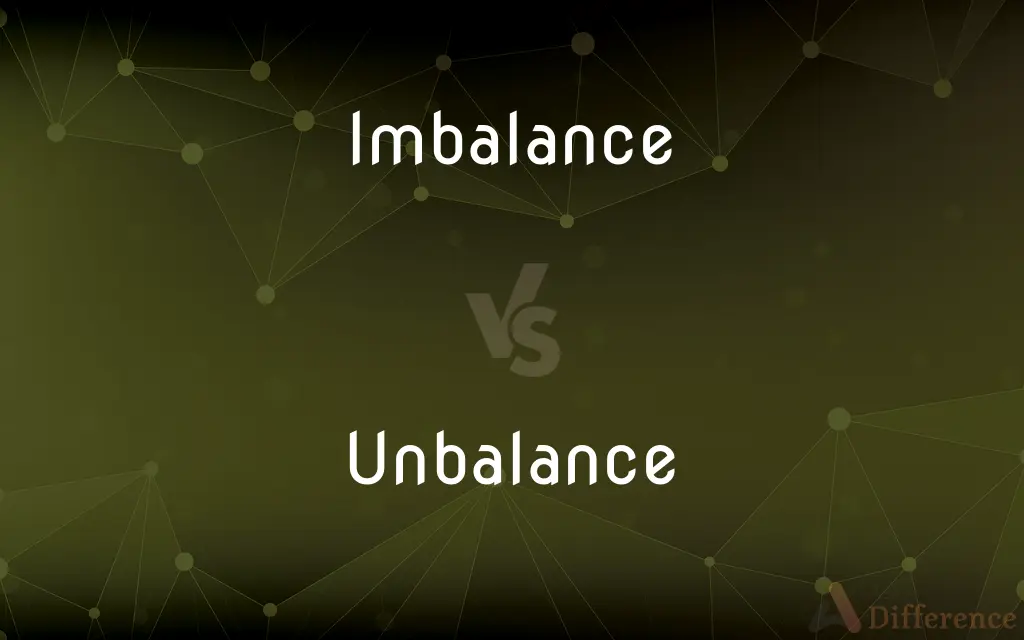Imbalance vs. Unbalance — What's the Difference?
By Tayyaba Rehman & Maham Liaqat — Updated on February 23, 2024
Imbalance refers to a lack of proportion or equilibrium in physical, social, or economic contexts, whereas unbalance typically describes the act or state of losing balance or stability, often used in more literal or mechanical contexts.

Difference Between Imbalance and Unbalance
Table of Contents
ADVERTISEMENT
Key Differences
Imbalance is a condition where elements within a system are not in equal or correct proportions, leading to a state of disequilibrium. This term is widely used in various fields, including economics, where it might describe uneven distribution of wealth, or in medicine, where it can refer to a chemical imbalance in the body. The concept of imbalance suggests a deviation from a desired or stable state, requiring adjustments or interventions to restore equilibrium.
Unbalance, on the other hand, usually pertains to the process or result of something being thrown off balance. It is often used in mechanical and physical contexts, such as when a rotating object becomes unbalanced due to uneven weight distribution. The term can also apply to situations where a previously stable state is disturbed, leading to instability or a lack of steadiness. Unbalance might be temporary and corrected once the factors causing the disturbance are addressed.
Both terms deal with a departure from balance, while imbalance often implies a systemic or intrinsic issue requiring more complex solutions, whereas unbalance might suggest a more immediate and sometimes simpler problem to solve. For instance, correcting an imbalance in a societal system may involve policy changes and long-term strategies, while fixing an unbalanced wheel primarily requires physical adjustments to the object itself.
The usage of these terms also differs slightly, with "imbalance" being more common in discussions about abstract, complex, or large-scale issues, and "unbalance" more frequently used in technical or physical contexts. Despite these nuances, in everyday language, the terms can sometimes be used interchangeably, especially in less formal discussions.
Imbalance and unbalance both describe conditions of non-equilibrium, while the former often denotes a broader, more entrenched condition affecting systems or entities, and the latter describes a more immediate state of instability, often with a clearer path to correction.
ADVERTISEMENT
Comparison Chart
Definition
Lack of equilibrium or proportion in various contexts
The act or result of losing stability or balance
Contexts
Economic, biological, social systems
Mechanical, physical objects
Implications
Systemic issues, requiring complex solutions
Immediate issues, often with simpler fixes
Restoration
May involve systemic changes or interventions
Typically involves physical adjustments or corrections
Usage
More abstract, broad issues
More concrete, technical situations
Compare with Definitions
Imbalance
A condition of disproportion or lack of equilibrium.
The economic imbalance led to widespread poverty.
Unbalance
To disturb the balance or stability.
The heavy load unbalanced the truck.
Imbalance
An unequal state requiring adjustment.
Hormonal imbalances can affect a person's health.
Unbalance
Loss of equilibrium in a system.
Sudden market changes can unbalance economic predictions.
Imbalance
Discrepancy in a system or relationship.
The trade imbalance between the two countries grew wider.
Unbalance
The act of causing instability.
Adding too much weight to one side unbalanced the boat.
Imbalance
Uneven distribution or lack of symmetry.
An imbalance in the ecosystem can endanger wildlife.
Unbalance
A temporary disruption of steadiness.
The abrupt stop unbalanced the passengers.
Imbalance
Lack of balance in physical forces.
Muscular imbalance can cause posture problems.
Unbalance
A state of being out of balance.
The unbalance of the fan caused it to wobble.
Imbalance
A lack of balance, as in distribution or functioning.
Unbalance
To upset the balance of; cause to become unsteady.
Imbalance
The property of not being in balance.
The growing imbalances between the rich and poor first lead to more crime.
Unbalance
To cause (a person or the mind) to be unbalanced.
Imbalance
A state of disequilibrium (as may occur in cases of inner ear disease)
Unbalance
The condition of being unbalanced.
Imbalance
(mathematics) a lack of symmetry
Unbalance
(transitive) To cause to be out of balance.
If you put that weight on the edge of the tray, it will unbalance it and dump all of the dishes on the floor.
Unbalance
A state of mental disturbance and disorientation
Unbalance
Throw out of balance or equilibrium;
The tax relief unbalanced the budget
The primadonna unbalances the smooth work in our department
Common Curiosities
Can societal issues be described as unbalanced?
While less common, societal issues can be described as unbalanced, especially when referring to sudden disruptions or shifts causing instability.
What are the signs of unbalance in machinery?
Signs include unusual vibrations, noise, or movement, indicating that adjustments are needed to restore stability.
How do you correct an imbalance?
Correcting an imbalance typically involves identifying and addressing the underlying causes, which may require systemic changes or targeted interventions.
What role does balance play in mental health?
Balance is crucial in mental health, with imbalances in chemicals, lifestyle, or stress levels potentially leading to psychological issues.
How does technology affect balance in work-life?
Technology can both contribute to and help address work-life imbalances, depending on how it's used to manage time and tasks.
What is a common method to diagnose unbalance in rotating equipment?
Vibration analysis is a common method for diagnosing unbalance in rotating equipment.
Is imbalance always negative?
While often seen as undesirable, imbalance can sometimes drive change or innovation, depending on the context.
Is it easier to correct unbalance or imbalance?
Unbalance is often easier to correct, especially in physical or mechanical contexts, as it usually involves making tangible adjustments. Imbalance, especially in complex systems, may require more comprehensive solutions.
Can unbalance be intentional?
Yes, unbalance can be intentionally caused, for example, in testing scenarios or to demonstrate instability.
Can an imbalance be temporary?
Yes, imbalances can be temporary, especially if they are promptly identified and addressed.
Can environmental factors cause unbalance?
Yes, environmental factors can cause unbalance, especially in ecosystems or when natural events affect human-made systems.
Can physical therapy correct muscular imbalances?
Yes, physical therapy is often used to correct muscular imbalances and restore proper function and posture.
What impacts do global trade imbalances have?
Global trade imbalances can affect currency values, lead to trade disputes, and impact economic growth.
How do economic policies address imbalances?
Economic policies may aim to address imbalances through regulation, subsidies, taxes, or other measures designed to redistribute resources or opportunities.
How do you measure imbalance in a system?
Measuring imbalance involves analyzing the distribution of elements within the system, often using statistical or analytical methods to identify disparities.
Share Your Discovery

Previous Comparison
Cod vs. Scrod
Next Comparison
Metrics vs. MatrixAuthor Spotlight
Written by
Tayyaba RehmanTayyaba Rehman is a distinguished writer, currently serving as a primary contributor to askdifference.com. As a researcher in semantics and etymology, Tayyaba's passion for the complexity of languages and their distinctions has found a perfect home on the platform. Tayyaba delves into the intricacies of language, distinguishing between commonly confused words and phrases, thereby providing clarity for readers worldwide.
Co-written by
Maham Liaqat















































